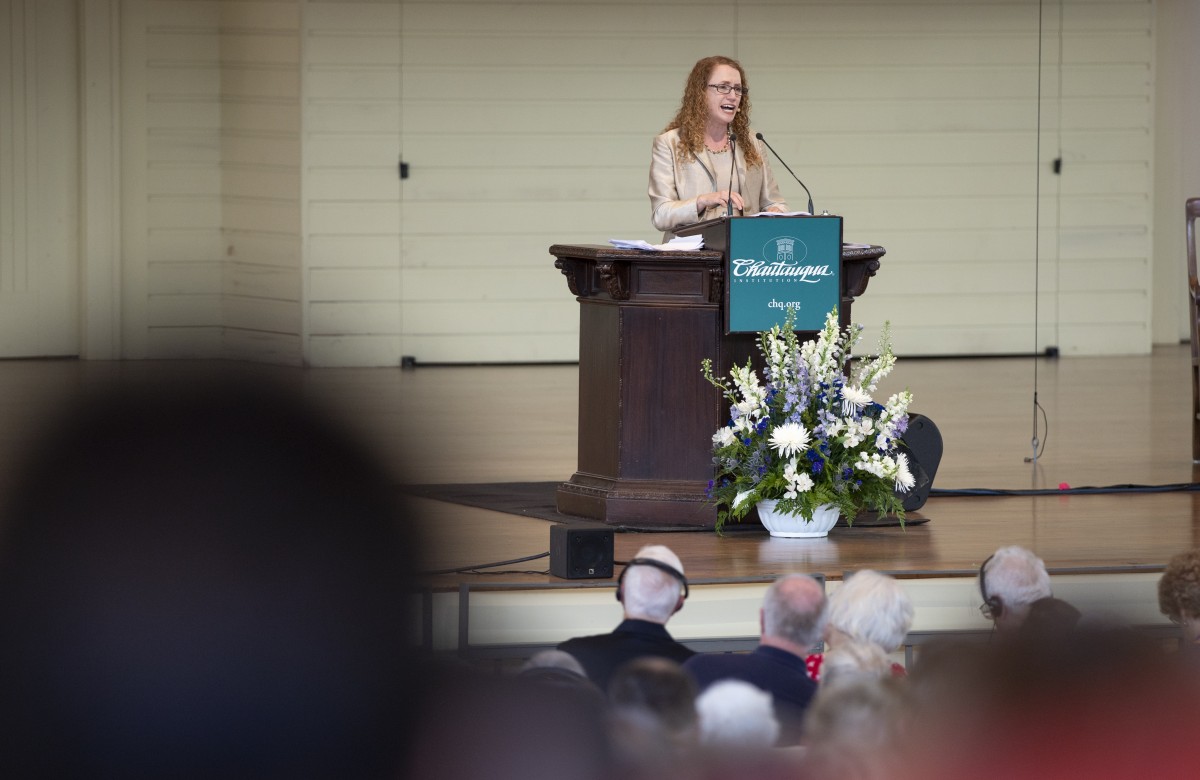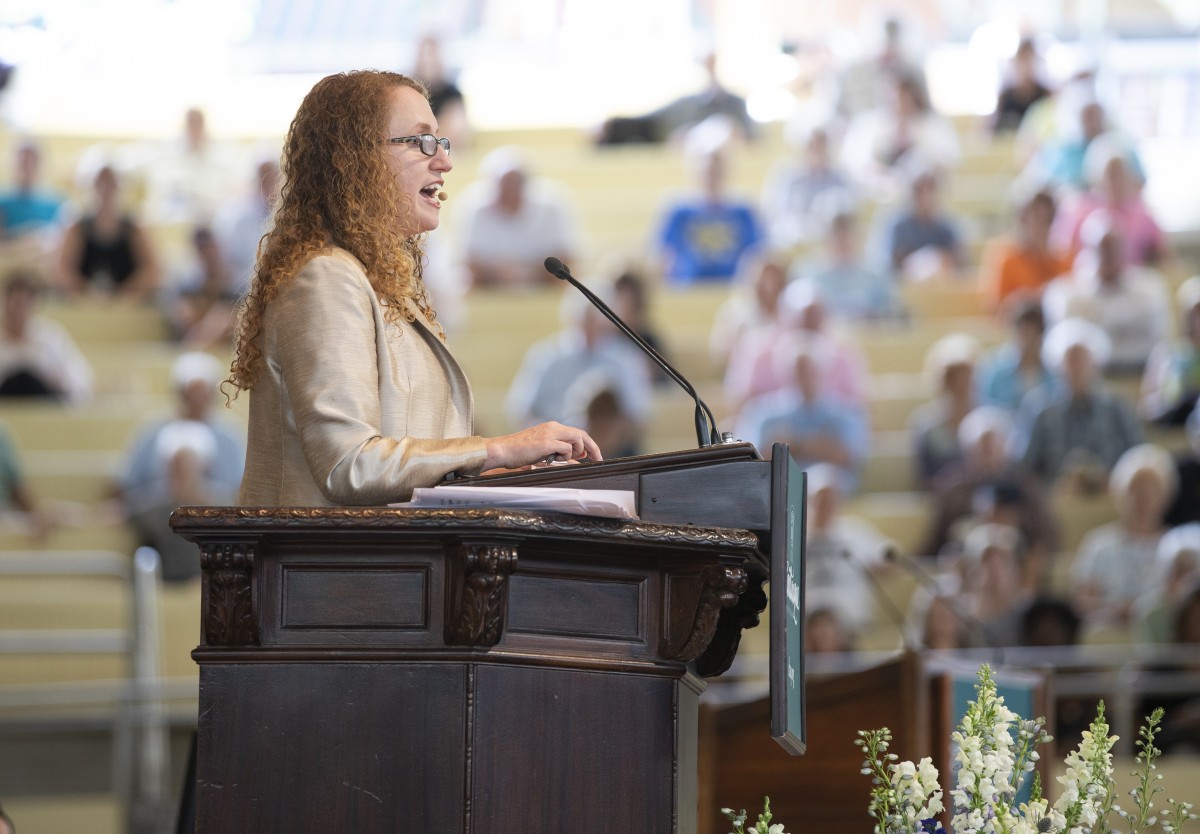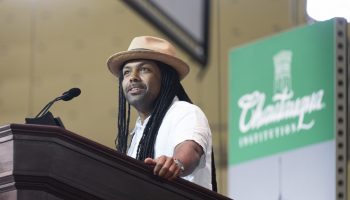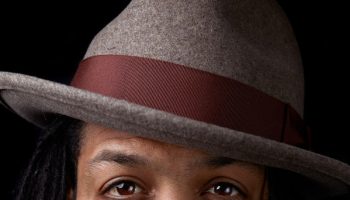
Factories and electrical plants surrounded Niagara Falls by the late 19th century. It took a painting, “Niagara Falls, from the American Side” by Frederic Edwin Church and the Free Niagara movement led by landscape architect Frederick Law Olmsted to loosen industrialism’s grip on the falls.
When Suzanne Nossel visited just a few days ago during her trip to Chautauqua Institution, the footprint of the Industrial Revolution on the nation’s oldest state park was nearly obsolete.
“If (Church and Olmsted) could use a visionary masterpiece and a shoe-level movement to snatch back Niagara Falls from the clutches of industry, maybe we could use our vision and vigor to restore free speech from the forces that threaten it,” she said.
The chief executive officer of PEN America spoke to free speech and looming threats to the First Amendment at the 10:45 a.m. morning lecture Tuesday, July 24, in the Amphitheater, continuing Week Five’s theme, “The Ethics of Dissent.”

PEN America is the leading organization when it comes to igniting national conversations around human rights and free expression issues. PEN America consists of writers, journalists, editors, translators and readers, Nossel said, who strive to “safeguard the written word.”
Nossel read PEN’s — timely — charter: “PEN declares for a free press and opposes arbitrary censorship. … Members pledge themselves to oppose such evils of a free press as mendacious publication, deliberate falsehood, and distortion of facts for political and personal ends.”
In her five-year tenure at PEN America, Nossel has worked on a variety of free speech issues, including censorship and internet oppression in China, constraints on civil society in Russia, free speech on college campuses and freedom of the press — but now, she is more alarmed about “how precarious our fundamental right to free speech has become” than ever.
“To protect free speech today, the First Amendment is necessary but not sufficient. … For free speech to survive and thrive in the new era, we, as citizens, need to race to defend it, even when that means rising in support of speech (from which) we personally dissent,” she said. “We need to understand new opportunities for speech, new threats to it and what it will take to safeguard discourse.”
Nossel addressed three threats to free speech: the rise of the digital age, ideological polarization, and ignorance and indifference to the First Amendment.
“In the past decade, online platforms have become a prime marketplace for our speech,” she said. “… (Social media are) also, make no mistake, markets for companies, campaigns and interests to spend millions on paid campaigns to shape where you buy, who you support and what you think. That same accessibility to openness has made social media platforms breeding grounds for hatred, harassment, manipulation and even terrorism.”
James Madison would have never predicted that while etching the First Amendment into parchment paper, Nossel said, but these platforms are not subject to the First Amendment — “our new public square isn’t actually public.”
Companies have their own community standards. It’s no longer a governmental body deciding rules and stipulations, she said.
“Everyday anonymous algorithms and individual Silicon Valley staffers in T-shirts make countless decisions about what stays and what goes — what becomes a sensation and what sinks in obscurity,” Nossel said. “Mark Zuckerberg thinks Sandy Hook conspiracy theorists are harassers, but he believes Holocaust deniers are just a little misguided.”
Twitter’s terrorists could be Facebook’s freedom riders, she said.
Like most tech CEOs, she said, Zuckerberg can enforce regulations as he pleases with minimal interference from the government because of two factors: social media platforms are international and the protections of the First Amendment do not extend outside of the United States’ borders; and menacing hate speech is protected speech.
“The utopian ideal of the internet as a beautiful, wild garden where all forms of speech can flower has become infested,” she said. “We now recognize that speech can be invasive, even poisonous, with the speech of some strangling that of others.”
The public outcries have caused companies like Facebook to grapple with “blurred boundaries” between offensive and dangerous speech on their platforms. Nossel said this is much more complicated than it seems. It matters not only what words are used, but who is using them.
“Among the most menacing forms of online content are fraudulent news and disinformation being used to skew discourse, sow divisions and even throw elections,” she said.
According to a Pew Research Center study, Americans are losing the ability to discern false from true information; 64 percent of Americans believe fabricated news stories cause confusion about basic facts of current events.
“Free expression is about more than just the right to speak,” Nossel said. “It’s the right to gather and harden information, to sort through competing ideas, engage with one another in search of a new truth, to persuade and be persuaded.”
Despite this growing discourse, most forms of “fake news” are protected speech, she said, and do not infringe on First Amendment rights except in instances like slander, libel and defamation.
“There are no easy answers to regulating speech online, but what is clear is we can’t leave it up to the courts — the First Amendment has very little to say about what you can post on Instagram,” Nossel said “… As citizens, when it comes to defending our discourse online, we have no one to turn to but ourselves. We need to summon our collective powers … to insist that with the great power of social media comes great responsibility.”
Nossel said the second threat to free speech is ideological polarization: The right is weaponizing the First Amendment, while the left is alienated and dismissive toward the principles of free speech.
Conservatives are using the First Amendment to curb government action for equality, she said. One threat to free speech from the right is President Donald Trump’s escalating campaign against the media — the “enemy of the American people.”
“If President Trump was shutting down newspapers or putting journalists in jail, … those tactics would blatantly violate the First Amendment. He’s too clever for that,” Nossel said. “He’s using his own First Amendment right for protected political speech to undercut the rights of the rest of us.”
According to a Quinnipiac poll, more than half of Republican voters agree with the president’s distrust of the media.
“This poses a fundamental threat to our system of self-government,” Nossel said. “It’s the job of the press to hold those in power accountable. President Trump knows that all too well; his is a deliberate strategy to neutralize criticism, shirk accountability … by insulting, denigrating, casting doubt on the messenger. And it’s working.”
Hate speech is also a threat growing from the right, Nossel said.
“Here in the U.S., hateful speech is mostly protected by the First Amendment, but until recently, it was bounded by strong taboos,” she said. “There were simply some things that were unacceptable in our discourse, not because of any laws, but because of a mainstream culture that shunned slurs, stereotypes and swastikas.”
The Trump administration has subverted those taboos, she said, giving rise to white supremacists like Richard Spencer. Spencer’s recent efforts have including speaking on college campuses to provoke a reaction from administrators and students.
Nossel said PEN America advises schools to allow white supremacists to speak alongside counterarguments.
“Through counterspeech, provost messages and Twitter campaigns, colleges can make it clear that allowing a platform for all viewpoints doesn’t amount to an endorsement,” she said. “But letting (white supremacists) appear denies them what they want more than anything else — reporting being shut down.”
This is tearing at liberals’ ideal of free speech, causing some progressives to question whether free speech is compatible with the values of equality and inclusion, Nossel said. And while counterspeech is imperative for combating hate speech, it can also silence other opinions.
This is the paradox of the college campus, she said.
“It’s a vicious cycle on the university quad,” Nossel said. “The right brings in offensive speakers to spread not just ideas, but partially to prove that they can. The left, in turn, calls to restrict speech in the interest of equality and inclusion. Such moves only feed right into the charges that speakers’ beliefs are oppressed.”
The final threat to free speech is ignorance and indifference to the First Amendment, Nossel said.
“We rely on the First Amendment every day, whether when we are opening up the morning paper, signing a petition, taking to the streets in protest,” she said. “It’s like the air we breathe, vital — (but) too often unused; we don’t celebrate it, teach it or, even it seems, remember it. The numbers paint a big picture:”
Nossel cited a survey in which 77 percent of Americans said they supported the First Amendment, but very few knew what it actually entails; 36 percent could name at least one of the five freedoms, and only one in the survey group of about 1,000 could list all five.
“As a society, we’ve long had the luxury of taking our free speech protections for granted,” she said. “To us, the First Amendment is absolute, all encompassing — as sure as the ground we walk on. … For too long, we’ve all been looking elsewhere while the fault lines have deepened under our feet.”
Nossel called for a new mobilization around the First Amendment that revolves around re-educating youth through civics classes to help them better understand free speech; defending free speech as a fundamental, American value; taking free speech into the digital era; and standing up for those who can’t do so for themselves.
America hasn’t always gotten free speech right, she said, and while democracy is veering off the course, it is now that Americans need more speech, not less.
“The writers and artists and actors PEN America supports are undaunting. … It’s the modern equivalent of those women in hats and ruffled collars who marched with the sandwich boards and said ‘save Niagara Falls.’
… Citizens are activated, electrified, empowered. That gives me and artists hope,” Nossel said. “And if those of us who passionately believe in free speech can harness that energy, we can mobilize a citizens’ movement that brings new light into this most basic human freedom.”
After the conclusion of Nossel’s lecture, Emily Morris, vice president of marketing and communications and chief brand officer, opened the Q-and-A. She asked what ethical principles drive PEN America.
Nossel said PEN tries to stay focused on its mission, not dive into politics, but still calls out threats to free speech.
Morris then turned to the audience for questions. One attendee asked what PEN America’s position is on kneeling for the national anthem.
Nossel said PEN America supports the choice to kneel during the national anthem. But, to her, the president’s open opposition to it is a new form of censorship.
“The president of the United States is heckling NFL owners to punish these players; he is trying to exact punishment for speech, maybe not directly, but by encouraging and insisting that the owners impose discipline,” she said. “That’s a government punishment for speech.”
Morris then asked if forms of expression (like applauding) during public forums were harmful to freedom of speech. She was quickly interrupted by various choruses of applause.
Nossel said she thinks forms of expression during public forums or debate can shape individuals’ ways of thinking.





